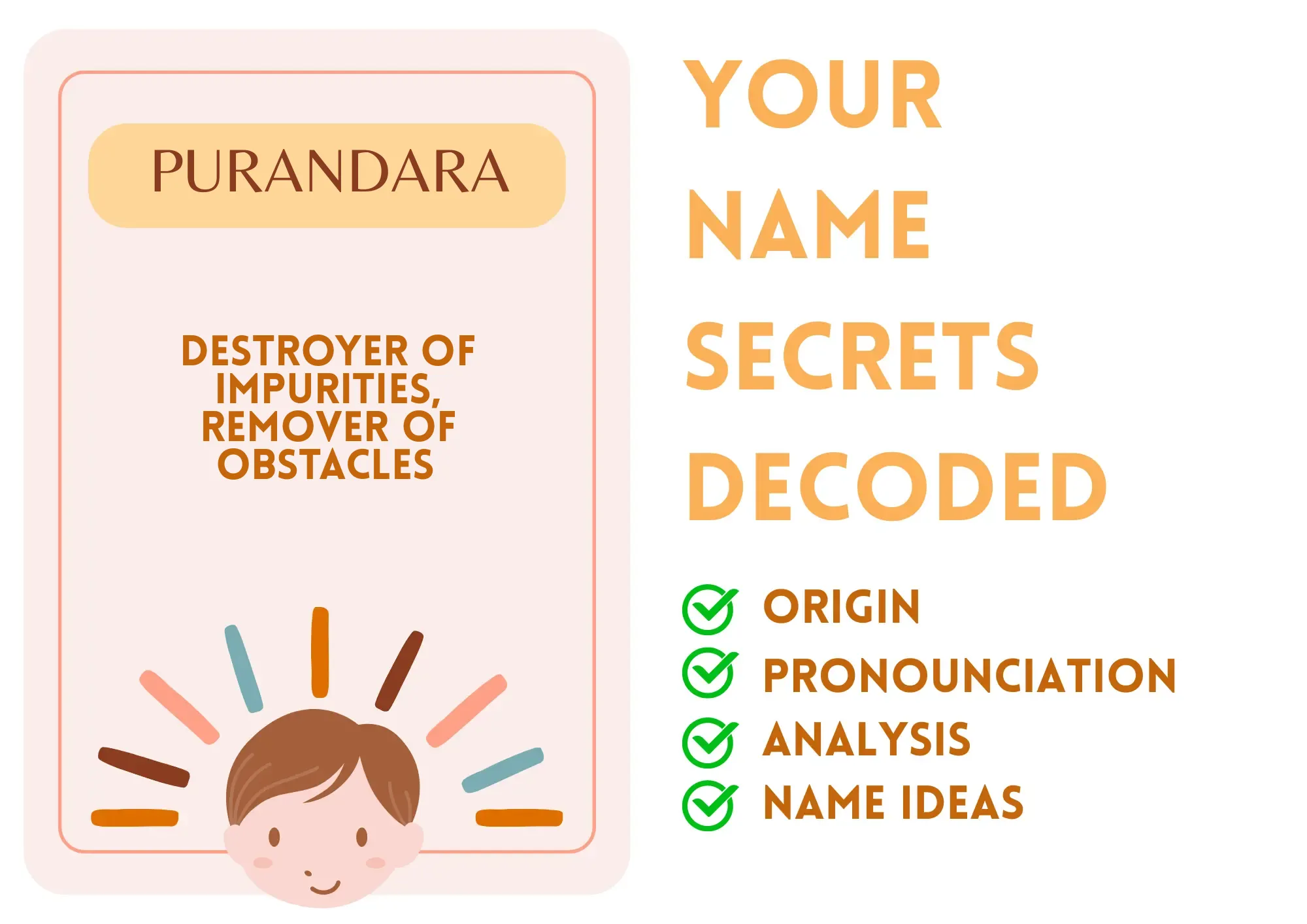
Purandara
Purandara is a name steeped in cultural and religious significance, primarily rooted in Indian traditions. The name translates to 'destroyer of impurities' or 'one who removes obstacles,' a nod to its connection with Lord Vishnu, who is seen as the preserver and protector in Hindu belief. Purandara is often used for boys, reflecting its masculine association.
Widely used in South Indian communities, Purandara not only signifies purity and strength but also pays homage to Purandara Dasa, a celebrated saint composer in the 16th century, known for his devotional singing and contributions to Carnatic music. The name evokes feelings of reverence and admiration within Hindu culture and beyond.
Purandara is generally perceived positively, resonating with notions of divine protection and purity. The name is spelt phonetically, making it relatively straightforward to write and call—for those familiar with its cultural context.
In literature and music, Purandara holds a revered place, especially in the context of Carnatic music and other devotional forms. It remains a cherished choice among parents who appreciate its roots and significances.
Basic Information
Gender: Boy
Sounds Like: Poo-ran-dah-rah
Pronunciation Explanation: The name is pronounced with emphasis on the second syllable: 'ran', while the 'u' in the first syllable is pronounced as in 'put'.
Summary and Meaning
Meaning: destroyer of impurities, remover of obstacles
Origin: Purandara has Indian origins, specifically within Hindu traditions and practices.
Usage: Purandara is traditionally a male name, given its references to masculinity in religious texts and its association with saints and musicians.
Name Number (Chaldean)
Name Number (Pythagorean)
Name Constellation (Nakshatra)
Name Zodiac Sign (Rashi)
Popularity (Global Rank)
Overall: 179652
Boys: 54235
Most Popular in
Religious and Cultural Significance
Religion: Hindu
Background: In Hinduism, Purandara refers to Lord Vishnu, highlighting the name's association with divine preservation and purity.
Cultural Significance: As a name with deep roots in the cultural fabric of Hinduism, Purandara symbolizes the removal of obstacles and the seeking of purity, making it a popular choice for boys.
Historical Significance: Historically, Purandara is associated with Purandara Dasa, a prominent saint and poet in the Bhakti movement of southern India, known for his devotional compositions in praise of Lord Krishna and other deities.
Popular Culture
Literature and Mythology: Purandara appears in various religious texts and stories, often in the context of devotional music and poetry.
Movies and Television: While not as common, characters or references to Purandara may appear in films and TV shows exploring Hindu mythology or classical music.
Feelings and Perceptions
Perception: Purandara is generally regarded positively; it embodies spiritual purity and devotion.
Positive Feelings: Spiritual, meaningful, cultured, respected, associated with music.
Negative Feelings: May be considered archaic or overly traditional by some; might be unfamiliar to those outside South Indian cultures.
Practical Considerations
Ease of Writing and Calling: The name Purandara is moderately easy to write and pronounce. While it involves multiple syllables, its phonetic spelling helps in pronunciation, particularly within its cultural context.
Common Typos and Misspellings: Purandhara,Purandar,Puranthara,Purandhura
Common Nicknames: Puru,Purand,Dara
Purandara Popularity
Purandara Usage and Popularity By Country
| Country | Rank (Overall) |
|---|---|
| India | 37220 |
| Pakistan | 37882 |
| United Arab Emirates | 67985 |
| Australia | 105589 |
| United Kingdom | 182431 |
Purandara Usage and Popularity By City
| City | Rank (Overall) |
|---|---|
| Bengaluru | 16542 |
| Udupi | 1066 |
| Dakshina Kannada | 1546 |
Compatibility Analysis
Famous Persons Named Purandara
No results found for Purandara.
Related Names
Similar Sounding Names:
Pandara,Parandha,Puran,Puranesh